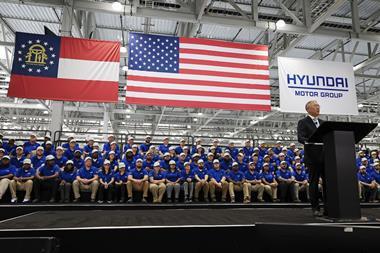
The industrial action, which looks more likely following the breakdown of bargaining sessions on Tuesday this week, would affect leading US ports, including Baltimore, Brunswick and Jacksonville, as well as the port of New Jersey and New York. The direct threat to container shipments of parts echoes recent problems the US has had on the West Coast ports of LA and Long Beach (read more here).
Members of the USMX Bargaining Committee, which represents container carriers, direct employers and port associations, met with wage scale delegates from the ILA last week with a proposal for a new contract. That proposal was rejected and a strike vote taken according to USMX. When the Federal Mediation and Conciliation Service (FMCS) recommended a short contract extension to keep both the parties at the table this week the ILA reportedly rejected it.
The dispute involves overtime rules and container royalties, the payments made to union workers based on the weight of cargo received at each port. The USMX wants to remove container royalty payments for new employees but proposes that existing recipients would continue to receive them at 2011 levels for 25 years or until they leave the industry. Annual royalty payments can add up to between $50,000 and $100,000.
According to Bill Kerrigan, director at KGI Consulting, while container shipments are certain to be affected by the action, pure car and truck cargoes are not and will be unloaded and loaded as usual. However, ro-ro vessels that carry cargoes of construction and agricultural equipment, or other project cargo, will not be worked because they are considered automated cargo. This is likely to have an impact on logistics providers such as Wallenius Wilhelmsen Logistics (WWL), which specialises in vehicle and project cargo transport.
In terms of containerised parts shipments, carmakers are reported to have made preparations in advance of any action for parts shipments to their assembly facilities, with contingency plans in place for shipments to move via other ports such as Halifax on the Canadian East Coast or through Vancouver port on the West Coast. OEMs will be measuring how quickly disruption to port services is likely to affect assembly plants and respond from there.
Extended bargaining period
Strike action at the East Coast and Gulf State ports was threatened at the beginning of October but called off when the USMX and ILA agreed to extend collective bargaining for a 90-day period to the end of the December following mediation by the Federal Mediation and Conciliation Service (FMCS). That decision was said to be “for the good of the country” and designed to avoid any interruption in interstate commerce said the FMCS (read more here).
Commerce now appears to be threatened again, including in the automotive sector, because of a failure to agree on the main issues at stake at last week’s meetings.
At smaller committee meetings held last week, again in conjunction with the FMCS, the ILA presented a counterproposal to USMX and while several issues were discussed. However, no agreements were reached there either said USMX.
Faced with a strike the Federal government could invoke the Taft-Hartley Act, a law designed to limit the impact of strike action on commerce, which could effectively force striking union workers to go back to work, pending negotiations.
The delay in the timing of the strike will be less damaging than it would have been in October in the lead up to the Thanksgiving and the Christmas retail sales period. Many will still be on holiday on the 29th December. That said, there could still be considerable disruption in terms of cargo delays, surcharges and demurrage costs according to Martin Dixon, business development manager at maritime research and advisor Drewry, and he said that automotive supply chains would be particularly vulnerable if the strike went ahead.
However, Dixon said that following discussions with US importers and exporters, the majority still expect the strike to be avoided and anticipate that some agreement will be reached between unions and employers.
A further meeting of the carrier members of the USMX Bargaining Committee and a committee from the ILA was held this week to discuss proposals relating to container royalty payments.

























![Global[1]](https://d3n5uof8vony13.cloudfront.net/Pictures/web/a/d/s/global1_726550.svgz)










